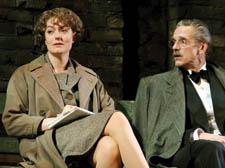|
|
 |
| |

Anne Chancellor and Jeremy Irons in Never So Good |
Historical theatre is rarely quite so good
NEVER SO GOOD
Lyttelton Theatre
HOWARD Brenton, our most consistently socialist playwright, has astounded the critics, enthused his audience and bewildered his enemies.
Never So Good is a masterly and generally sympathetic biographical portrait of Harold Macmillan (1894-1986), who was Prime Minister between 1957 and 1963.
He looked and acted publicly as the last Edwardian upperclass Teddy boy.
But the brutality of trench warfare in 1914-18 led not to self-pity but to a lasting admiration for the working-class soldiers.
He spoke of them later as having “noble lustre in their eyes”.
Brenton’s map of his life is flawless.
Macmillan says sadly at the end, “My only love had been an older boy at Eton College”.
After the Great War he represented Stockton-On-Tees in the Commons, where he joined Churchill and the minority anti-appeasement group of the Tory party.
But it was after the Tory post-war revival in 1951 that he blossomed and one by one he filled the great offices of state.
His droopy walrus face became the likely symbol of the 1960s ‘Affluent Society’. He cried: “You never had it so good” before winning a hundred seat majority in 1959. Ironically it continued into the ‘Permissive Society’ and this was one of the reasons of his downfall in 1963: Sex scandals, prostitution and Russian spies.
Jeremy Irons is perfect as the old actor manager shadowed by his youthful former-self, Pip Carter, an irritating but essential ghost of his conscience.
Churchill, a natural inspirational leader, is given as good an impression as I have ever seen by Ian
McNeice.
Bob Boothby, the bisexual lover of Dorothy Macmillan and the gangster Ronnie Kray, in Ronnie Glenister’s hands is volatile, vile, clever, brutally honest and deeply flawed.
Anthony Eden
(Terence Hardiman is the aging matinee idol and Prime Minister between 1955 and 57) pops handfuls of amphetamines and gulps down tumblers of whisky to calm him down during the Suez crisis of 1956.
It’s all compelling history.
Later Macmillan’s basic intellectual honesty triumphs over his political cynicism. His “Wind of Change” speech, delivered before an apartheid Parliament in South Africa, followed by his stinging rebukes to Thatcher in the House of Lords about selling the family silver, is to his eternal credit.
Touchingly enough, in old age he found great comfort in the friendship of Eileen O’Casey, the widow of the great Irish playwright Sean, who had been a staunch member of the British Communist Party and one of Macmillan’s authors for his family's publishing house.
At the end the ever-immaculate Jeremy Irons bids us a dignified goodnight, a man of private pain and public triumph.
A fascinating evening with the last of the one-nation Tories. |

|
 |
|
|
 |
|



